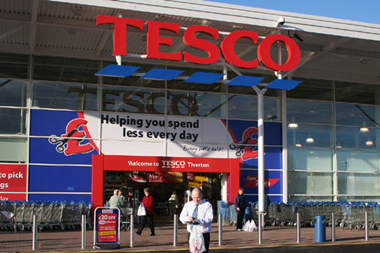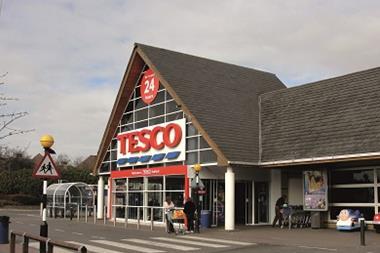If Carlsberg did supermarkets they would not look like Tesco.

Not only is Britain’s biggest retailer still suffering from falling sales and profits a year after the arrival of new chief executive Dave Lewis, it has also removed Carlsberg cans and bottles from its supermarkets in an attempt to simplify its product range.
Tesco has more than 3,500 stores and 300,000 employees in Britain, so its importance to retail, property and the economy should never be underestimated.
Lewis, who was hired from Unilever, was never going to have an easy task in turning around the Tesco supertanker. When he started as chief executive last September, he inherited a retailer that was enduring its worst fall in sales for a generation, had a tarnished brand image, and was overloaded with debt.
The situation got much worse before Lewis could make it any better as a whistleblower uncovered a £326m accounting scandal that sparked a Serious Fraud Office investigation. In October 2014, when Lewis reported his first set of financial results as chief executive, it genuinely felt like Tesco was unravelling.
A year on from the chaos, it is to Lewis’s credit that Tesco at least brought an air of normality to its interim results earlier this month. However, the figures themselves underlined the scale of the challenge still ahead for Tesco. They showed a 55% fall in operating profits before one-off items (which stripped out the impact of the accounting scandal and write-offs on last year’s figures) and a 1.1% drop in like-for-like sales in the UK.
Senior figures at Tesco have long talked about the turnaround job taking five years. However, it is difficult to believe that if Lewis had been told that these would be the company’s financial results a year into his tenure, even after the accounting scandal, he would have been happy.
The 50-year-old has thrown hundreds of millions of pounds into lowering prices, putting more staff on the shop floor and improving the availability of key products.
Yet, Tesco is still suffering from falling sales and the cost of these initiatives means operating margin - which rose to well over 5% in the days of Sir Terry Leahy - was just 0.77% in the UK and Ireland in the six months to 29 August. Furthermore, even after the £4.2bn sale of its South Korean business, once a jewel in the crown, Tesco’s debts including its pension deficit and lease liabilities are still £17.7bn.
Tesco’s credit rating is already junk, but after the latest results Moody’s warned that it could be cut further unless the retailer’s profitability improves in the second half of the year.
The rating agency warned that Tesco needs to deliver an increase in like-for-like sales and operating margins of around 3% to see an improvement in its credit rating.
Lewis has insisted there are signs of progress, such as an increase in the volume of products Tesco sells and the number of customer transactions. But given the investment the company has made and the low base it is comparing itself against, this is the least that should be expected. Tesco’s rival Sainsbury’s can make a similar boast, but it is generating significantly bigger profits.
Philip Clarke, Lewis’s predecessor, was compared with David Moyes because he struggled to follow a successful leader in Sir Terry Leahy in the same way that Moyes struggled to follow Sir Alex Ferguson.
Staying with sporting analogies, Lewis has to be careful that he does not become the retail world’s Stuart Lancaster.
The England rugby coach, like Lewis, inherited a mess and tried to get his team back on track by focusing on values, character and teamwork. However, when it really mattered in the Rugby World Cup, Lancaster came up short.
Some of Lewis’s quotes even sound like Lancaster. The Tesco boss has said the retailer must “behave our way out of this”. But with the company’s debts up and its profits down, more tangible proposals are needed.
City analysts have urged Lewis to launch a multibillion-pound rights issue to shore up Tesco’s finances and give the company the firepower to focus on growing sales. However, Lewis has ruled out this option.
The arrival of Lewis and his undoubted communication skills last year helped to boost morale among beleaguered Tesco staff. But more recently staff have become frustrated, particularly over the end of the company’s defined-benefit pension scheme and how this was communicated.
Lewis talks a good game, but would surely benefit from a hard-headed industry veteran mentoring him through the dramatic changes at Tesco, as Lancaster would have benefited from such support in the England set-up. John Allan, Tesco’s chairman, may yet prove to be the man.
It is still too early to judge Lewis, but anyone hoping that he would be the saviour of Tesco and fix its problems with the wave of a magic wand has had a reality check. Britain’s biggest retailer is still struggling.
Graham Ruddick is senior business reporter at The Guardian





























No comments yet